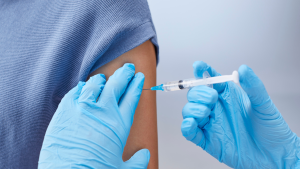Could A Vaccine You Probably Already Have Protect Against Gonorrhea?

There’s potential good news in gonorrhea prevention. A series of studies suggests that certain meningococcal B (MenB) vaccines can reduce the risk of gonorrhea. As a result, public health experts in England have decided to offer the vaccine to people more likely to be exposed to gonorrhea.
In the United States, gonorrhea is the second most common reported bacterial STI. There were over 600,000 cases of gonorrhea diagnosed in this country in 2023. Because so many cases of gonorrhea have no symptoms, many people never get tested. That means it is likely there are far more annual cases. In fact, the CDC estimates there are actually 1.6 million case each year.
Preventing Gonorrhea
We’ve been able to cure gonorrhea for nearly 100 years, but we are running out of medications that work. The bacterium that causes gonorrhea has been steadily changing to evade entire classes of antibiotics. As early as the 1940s, these bacteria were resistant to sulfanilamides. By the 1980s they were resistant to penicillins and tetetracyclines. In 2007, the CDC stopped recommending fluoroquinolones. This leaves cephalosporins as the only effective treatment. This makes prevention even more important.
We already have some effective prevention tools. Condoms block the exchange of semen and cervical secretions which is how the bacteria are spread. Doxy PEP involves taking an oral antibiotic after condomless sex to prevent STIs. It has been found to be about 50% effective against gonorrhea and 80% effective against chlamydia and syphilis.
There is no vaccine against gonorrhea, which is caused by the bacterium Neisseria gonorrhoeae. But there is a vaccine against meningococcal meningitis, caused by the bacterium Neisseria meningitidis. These bacteria are genetically similar. Scientists have been studying whether meningococcal B (MenB) vaccines provide any protection against gonorrhea. Two new reviews of research suggest they do.
New Research on an Existing Vaccine
These reviews—conducted by researchers in Hungary and Greece—found that the incidence of gonorrhea was lower in people who received the 4CMenB vaccine than it was in individuals who weren’t vaccinated or had received other meningococcal vaccines.
One of the components in the vaccine is called OMV or outer membrane vesicles. OMV are naturally released the type of bacteria that cause meningococcal meningitis and gonorrhea. OMV mimic the outside of bacteria and resemble a pathogen but they are non-living so they can’t cause disease. This makes them an effective vaccine delivery system.
The Hungarian researchers analyzed seven studies, six of which studied the 4CMenB vaccine. They found a pooled vaccine effectiveness (VE) of 38% against gonorrhea infection. The pooled VE went up slightly—to 41%—when they looked only at the studies of the 4CMenB vaccine.
Similarly, the researchers in Greece analyzed nine studies, eight of which studied the 4CMenB vaccine. They found a pooled VE of 30% against gonorrhea. They concluded, “While randomized clinical trials are necessary, the findings of this systematic review and meta-analysis highlight the potential effectiveness of OMV-based vaccines in terms of gonorrhea prevention.”
A New Gonorrhea Prevention Effort in England
Based on these studies, England’s National Health Service (NHS) announced plans to offer vaccines for people at high risk of contracting gonorrhea. The NHS is suggesting the vaccine primarily for men who have sex with men who have multiple partners or have had an STI recently. The MenB vaccine is usually suggested for teens 16 to 18, so for some men this will be a booster. Others may not have gotten the shot or may have received a different version of MenB vaccine. The 4CMenB vaccine wasn’t approved until 2015 so some of this may be based on age.
“The launch of a world-first routine vaccination for gonorrhoea is a huge step forward for sexual health and will be crucial in protecting individuals, helping to prevent the spread of infection and reduce the rising rates of antibiotic resistance strains of the bacteria.”
Dr. Amanda Doyle, National Director for Primary Care and Community Services at NHS
What about the United States?
There is no plan yet to vaccinate MSM in the United States. However, people who think they are at risk of getting gonorrhea may want to talk with their health care provider. They should ask if they’ve gotten the 4CMenB vaccine in the past and whether their provider would suggest a booster.
In the meantime, condoms and doxy PEP can help prevent the spread of gonorrhea. It’s also important to get tested for gonorrhea regularly because this infection often has no symptoms. The sooner someone finds out they have gonorrhea, the sooner they can treat it. This can stop them spreading it to partners and developing long term health issues. Treatment is prevention.
More to Explore

New Report Highlights Missed Opportunities for Congenital Syphilis Prevention
New Report Highlights Missed Opportunities for Congenital Syphilis Prevention Congenital syphilis occurs when a pregnant patient with syphilis passed the infection on to their baby. It can cause miscarriage, stillbirth, and even infant death. Babies born with syphilis can face lifelong medical issues. The good

All About Condoms
Currently, condoms are the only widely available, proven method for reducing transmission of HIV and other sexually transmitted infections (STIs) during sex. Condoms work.

Anal Sex and STIs
Anal sex may have once been thought of more taboo than other sexual behaviors, but today we know it’s a perfectly normal way to find sexual pleasure.

Celebrate the Start of #safesexysummer in June
It’s time to celebrate the start of summer! June is filled with national observances to help you start the summer off right. We’re here to help make June the start of a #safesexysummer.

Could A Vaccine You Probably Already Have Protect Against Gonorrhea?
There’s potential good news in gonorrhea prevention as a series of studies suggests that certain meningococcal B (MenB) vaccines can reduce the risk of gonorrhea.

New Recommendations to Make IUD Insertion Less Painful
There is new guidance on pain management for IUD insertion and acknowledgement that providers often underestimate the pain patients feel during their procedures.

FDA Approves At-Home Collection Device for Cervical Cancer Screening
The FDA just approved the Teal Wand, a self-collection device for HPV testing that does not require a speculum exam or even a trip to the doctor’s office. People can collect their own sample at home and send it to a lab for analysis.

One and Done? New Study Suggests that One Dose of HPV Vaccine May Be Enough
The results of large-scale study of HPV suggest that one shot of the vaccine may be enough to protect young people from HPV and related issues like cervical cancer.
The post Could A Vaccine You Probably Already Have Protect Against Gonorrhea? first appeared on American Sexual Health Association.







